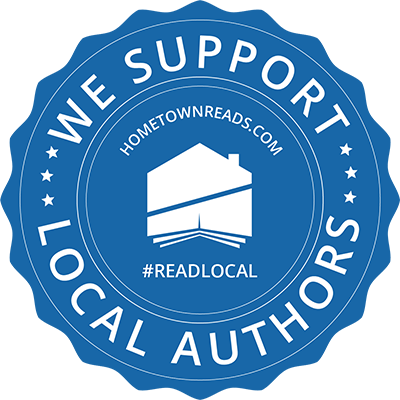It’s easy to get excited after you’ve written your first draft. We know you want to show it to the world. But don’t! Please don’t. Here’s an easy process to remember to make your manuscript the best it can be—before showing even one word to your closest friend, or gasp, to an editor. We believe this process is time well spent. Read on to learn more about our Manuscript Separation process.
1) If you haven’t started writing your first book and your reading this blog, that’s okay. a) Do as much research as you need to start writing Manuscript 1. b) Begin writing 200-1000 words a day, 6 days a week until you reach the desired story length. (90,000 words is the length of a typical fiction book.)
2) Writing the first draft can be frustrating. Enjoy the process. No matter if it takes you 30 days or 30 months, this is the first draft of Manuscript 1. Ever. Make it whatever you want it to be. Take your time and add as much of the story as you can during this process.
Note: If you get stuck or have writer’s block, no worries. Relax and unwind. Do some more research on your topic, or get inspired by attending a local writer’s group meeting. Writers are helpful, unselfish people and most want to see their peers succeed.
2) You’ve finished writing your first draft. Congratulations! Now, here’s the most important step in your manuscript process. Put it aside and don’t touch it for 3 months—that’s 90 days of not looking at one word, not even the title. I know, I know. It’s finished, and you want to tweak every last word. Why? Because you can. Revising it now at this stage of the process would be a crucial mistake and could be hazardous to the manuscript. Wait 3 months before reviewing this first draft. Waiting can be tough, but this is very important. Plan a vacation, start a new hobby, outline a new story. Do anything but read Manuscript 1.
Note: If you do think of an idea to add to the manuscript during your time away, write it down in a journal with the date on it (or the day in the process, like Day 25 of 90) so you don’t forget the inspirational idea that could fix that plot hole or character flaw.
3) Day 91: You’re ready to review your manuscript. You’ve been a good writer and haven’t peeked. That’s wonderful! Now, check that journal for any notes to refresh your memory and start reading.
Note: More revisions are typically made on Chapter One than any other chapter. Don’t have a favorite. Spend equal amounts of time on every chapter. I know some are more needy than others and require more attention. Just be aware that you’re not spending all of your time with just one chapter. Remember to add details for characters, like oh I don’t know, them wearing clothing and having skin color, eye color, hair color, etc., so your characters are not running around invisible and naked. LOL! 🙂
4) You’ve finished the second draft. Writer, what are you going to do next? No, (shaking head) not send it to an editor. Wrong answer. Go to Disney World? Maybe. The one thing you need to do: put Draft 2 aside for 2 short months. 60 days, that’s all. You can do it!
Note: During your off time of Manuscript 1, you could begin research on Manuscript 2.
5) Day 61: Review draft day. As you go through the manuscript this time, you’ll see plot holes or character flaws more easily. During this review, you’ll probably spend more time on specific scenes in the story, making sure the story arc is what it needs to be and making the characters live and breathe. When you’ve fixed those plot holes, you’re ready for the next step.
Note: Getting distance away from Manuscript 1 is very important and allows for you to have “Fresh Eyes” on your manuscript. Some writers say they don’t even remember writing some of the things in their manuscript while reviewing.
6) Next step. Put Draft 3 away for 1 month before reviewing it. Easy peasy. The time will go quickly.
Note: During this month off from Manuscript 1, write 5 diary entries your main character would write. If, after you write these entries you discover more about your character’s flaws and characteristics, be sure to write them down in your journal and include them when you begin your next review.
7) Day 31: Review Day of Draft 4. Take your time with this review, be critical and watch for minor typos and grammatical errors that may have popped up during the revision process. Add any details about your character that you may have missed before, but don’t spend a lot of time on changing scenes/character revisions. This review is meant to be more of a proof, than a rewrite. A rewrite at this point shouldn’t be needed. After this review you should have a clean manuscript.
Note: If you’re fully satisfied with your manuscript at this point, that’s great! If not, take another month away from it and do more revisions. If you’re really stuck, do one of two things: a) join a writer’s critique group and ask for suggestions, or b) set up a time to talk with one of us at Written Dreams and we can put you in contact with a professional to help you.
8) Submission time? Your manuscript has been fully revised, it’s typo free and full of fun details about your characters and the adventure they embark upon. You’re excited and ready to submit to an editor, but first, should you have someone else read it? That depends. If this is truly your first manuscript and you know other writers, you could ask a few willing beta readers. Many pros do this, and it’s not a bad idea at all.
Note: If you do send your manuscript to beta readers keep in mind that you may end up doing more revisions. Remember to take time away from Manuscript 1 after any revision process, a minimum of 30 days after revising any scenes.
8) Submission time: sending Manuscript 1 to an editor. Request their submission guidelines and format your manuscript in their suggested format. Then, off it goes!
Note: You will worry. We know. Remember that editors read manuscripts for a living and that Manuscript 1 isn’t the only one they have on their schedule. After you send your manuscript out, write down the date sent, and then start a new project. Check in with the editor after 6-9 weeks have passed to check on the status of your manuscript.
Good luck! We hope this article helped you. This a suggestion for a process that we’ve seen work for many authors. Ultimately, you need to decide what process works best for you. If you have any questions, you may contact us through our contact page on our website. Check out our store at writtendreams.com/store for some great reads by other authors!
 Family fights for family. That’s what Max Ryan believed and what she stood for. So how come in this new world, it’s not the easiest thing to do? If Max Ryan doesn’t act fast, living in an unfamiliar world could kill her.
Family fights for family. That’s what Max Ryan believed and what she stood for. So how come in this new world, it’s not the easiest thing to do? If Max Ryan doesn’t act fast, living in an unfamiliar world could kill her.
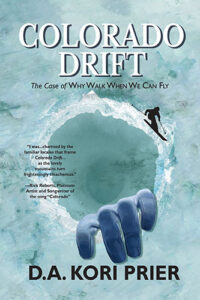

 I can’t quite go as far as to say that I am grateful I was diagnosed with breast cancer, but I can say that I am grateful for all of the realizations that have resulted because of it. I was given the opportunity to tap into a reservoir of courage I didn’t even know existed. I witnessed people at their best as they surrounded me with their clinical, surgical, and scientific expertise, genuine concern, humor, compassion, energy, and love. The word friendship took on a whole new meaning with each chemo sitter who took time out of her busy life to sit with me for hours on end. And I found out that my marriage was indeed for better or worse.
I can’t quite go as far as to say that I am grateful I was diagnosed with breast cancer, but I can say that I am grateful for all of the realizations that have resulted because of it. I was given the opportunity to tap into a reservoir of courage I didn’t even know existed. I witnessed people at their best as they surrounded me with their clinical, surgical, and scientific expertise, genuine concern, humor, compassion, energy, and love. The word friendship took on a whole new meaning with each chemo sitter who took time out of her busy life to sit with me for hours on end. And I found out that my marriage was indeed for better or worse.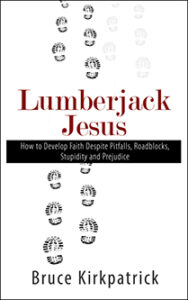


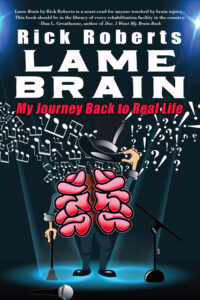 A multiplatinum rock star’s life meets an unexpected detour when a bump on the head reveals itself to be a Traumatic Brain Injury (TBI). Told with honesty and humor, Lame Brain: My Journey Back to Real Life is Rick Roberts’ story of his entangled afflictions of TBI and Alcoholism.
A multiplatinum rock star’s life meets an unexpected detour when a bump on the head reveals itself to be a Traumatic Brain Injury (TBI). Told with honesty and humor, Lame Brain: My Journey Back to Real Life is Rick Roberts’ story of his entangled afflictions of TBI and Alcoholism. Rick Roberts is a 40-year veteran of the rock’n’roll wars. He began his recording career in 1970 with the Flying Burrito Brothers and was a major contributor to their last two albums. He went on to do two solo albums and then form the well-known band Firefall in 1974, with whom he played for seven years during their heyday. He has also been a member of Stephen Stills’ band and Linda Ronstadt’s band during his career, and has been awarded two platinum and four gold albums for his efforts.
Rick Roberts is a 40-year veteran of the rock’n’roll wars. He began his recording career in 1970 with the Flying Burrito Brothers and was a major contributor to their last two albums. He went on to do two solo albums and then form the well-known band Firefall in 1974, with whom he played for seven years during their heyday. He has also been a member of Stephen Stills’ band and Linda Ronstadt’s band during his career, and has been awarded two platinum and four gold albums for his efforts.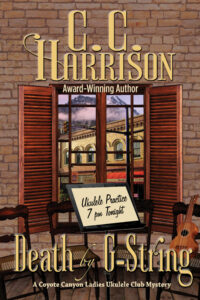 Can Viva Winter find the truth before it’s too late?
Can Viva Winter find the truth before it’s too late?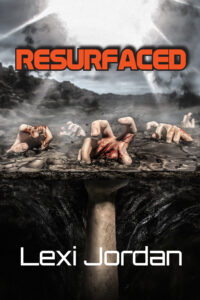 Before a large asteroid hit Earth and wiped out most of all humanity, survivors gathered in The Burrow, an underground community, with the hope of survival being the one thing on their minds. Realizing their fate, the Burrow dwellers developed a new society.
Before a large asteroid hit Earth and wiped out most of all humanity, survivors gathered in The Burrow, an underground community, with the hope of survival being the one thing on their minds. Realizing their fate, the Burrow dwellers developed a new society. About the Author:
About the Author: 



